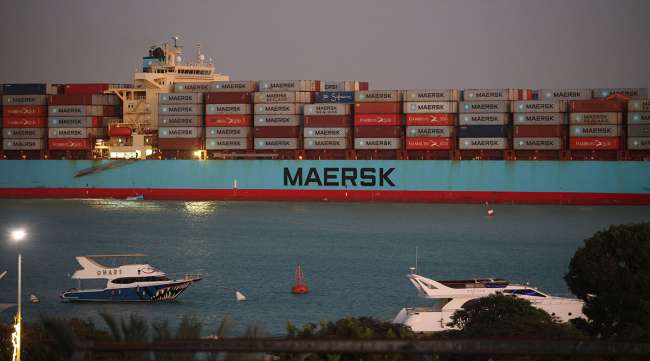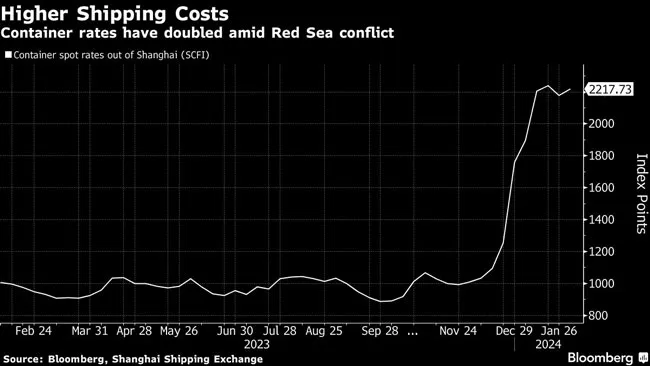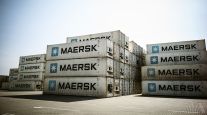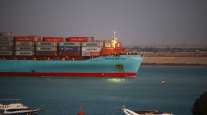Bloomberg News
Maersk Warns of Slowdown Once Freight Boost Fades

[Stay on top of transportation news: Get TTNews in your inbox.]
A.P. Moller-Maersk A/S shares plunged after the shipping company said it expects renewed gloom in the industry later this year when the current boost to freight rates from the Red Sea conflict evaporates.
That will still leave global container trade growth at 2.5% to 4.5% for the full year, Maersk said, providing a 2024 financial outlook that missed most analyst estimates. About a third of Maersk’s fleet is affected by the Red Sea turmoil, which it assumes will last from one quarter to a year.
The shares fell as much as 15%, erasing all their gains since the start of the attacks in mid-December. They declined 14% as of 11:24 a.m. on Feb. 8 in Copenhagen. Peer Hapag-Lloyd AG slid 13% and D/S Norden A/S 11%.
“The amount or the range of weapons that are being used for these attacks is expanding and there is no clear line of sight to when and how the international community will be able to mobilize itself and guarantee safe passage for us,” CEO Vincent Clerc said in an interview with Bloomberg TV. “We’ve not seen the level of threat peak, to the contrary.”
Maersk’s ships have been direct targets of missiles launched by Houthi militants and the Danish company, which controls one-sixth of the world’s containerized trade by sea, has joined other carriers in sailing the long route south of Africa.
The attacks have dramatically slowed shipments through a key waterway that would normally handle about 12% of seaborne trade and have tipped the balance between global shipping supply and demand, causing freight rates to soar.

The situation will mask a global overcapacity problem “for a while,” Clerc said. “Over time there is so much new tonnage coming in that this will eventually overwhelm the tonnage that is deployed in these longer routes, even if this situation was to endure for one or two years.”
Maersk, which ranks No. 5 on the Transport Topics Top 50 Global Freight Companies list, estimates that the global container fleet will grow 12% to 13% this year as new ships are launched, while sending vessels south of Africa only takes out 6% of the world’s capacity, Clerc said at a briefing in Copenhagen. With order books indicating that the same volume of new ships will enter the market next year, the industry will be challenged “this year, possible also in 2025 and a bit longer,” he said.
The Red Sea conflict “doesn’t even come close to having the same impact” as COVID-19 and other recent global events had on raising shipping rates, the CEO said. “It just doesn’t have that potential.”
Maersk already flagged in November, before the attacks had started, that overcapacity would plague the market for years. Back then, the company announced it would cut 10,000 jobs, seeking savings of $600 million.
On Feb. 8, the Copenhagen-based company suspended its current stock buyback program with immediate effect, given uncertainty in the market. The program had been under review since November. It plans to consider restarting purchases “once market conditions in Ocean have settled,” the company said, referring to its seaborne unit.
Want more news? Listen to today's daily briefing above or go here for more info
The industry’s “significant oversupply challenges” will “materialize fully over the course of 2024,” Maersk said in a statement. Still, it said its guidance for this year is in a wide range, reflecting uncertainty about the duration and degree of the Red Sea disruption. It also said results will be better in the beginning of the year than in the end.
Maersk said underlying earnings before interest, tax, depreciation and amortization will be $1 billion to $6 billion this year, lower than an average analyst estimate of $6.41 billion. The shipping line also reported fourth-quarter profit by that measure that missed most estimates.
Separately, Maersk said it will spin off its towage unit, Svitzer, expecting a listing on the Copenhagen stock exchange in April. Maersk shareholders will receive stock in the new separate company.
Before the release of the earnings report, Maersk experienced problems with its computer network that disrupted operations in some locations in the Americas. Clerc ruled out a cyberattack and said the effect on operations was limited and that the problems have been solved.




